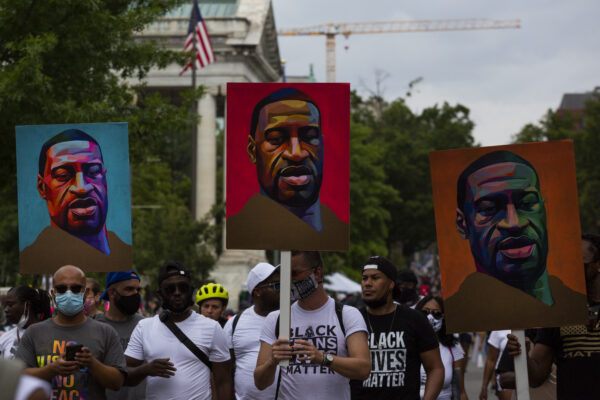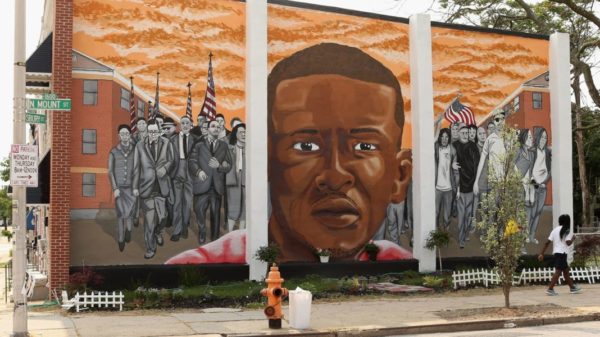A Black Maryland man sentenced to 10 years in prison on a weapons charge is calling on the state’s courts to reverse his conviction, alleging police violated his constitutional rights and had no legal basis to pursue him when he fled a street corner in Baltimore when he saw a patrol car.
State prosecutors argued that police had the right to search Tyrie Washington, 24, because he fled in a “high-crime” area, which gave detectives reasonable suspicion of criminal activity. Washington said he feared for his safety when he saw the Baltimore City police in July 2020, given the relationship between law enforcement and Black men, which had been proven volatile in his city with the police killing of Freddie Gray and just months earlier nationally with the Minneapolis police killing of George Floyd.

“The idea that it’s a common sense conclusion in 2022, that running from the police means you’re involved in criminal activity — it just doesn’t hold up anymore,” Claire Rasin Caplan, Washington’s defense attorney, told Atlanta Black Star.
Baltimore City detectives said they were patrolling a street in a northwest Baltimore neighborhood in a marked police vehicle when they noticed Washington and another man standing in an alley. As the two men saw the officers, they took off running, court documents obtained by Atlanta Black Star show. Detectives caught up with Washington after he fell while attempting to scale a fence. As one detective handcuffed the man, another detective patted him down and found a handgun in his waistband.
Washington was charged with, among other crimes, wearing, carrying a loaded handgun. He entered a conditional guilty plea and filed an appeal. Caplan said the stop violated his Fourth Amendment rights and rights under Article 26 of the Maryland Declaration of Rights.
The Fourth Amendment protects people from “unreasonable searches and seizures.” Caplan argued that the court should consider broader search and seizure protections Washington had under the Maryland Declaration of Rights. Article 26 requires a warrant specific to a person, place or thing for a search.
Baltimore City detective Darwin Noesi told the court that he and his partner were “riding around checking on” the area with “large amount[s] of individuals selling and distributing narcotics.” He was ordered to “pay special attention to” the neighborhood because of the prevalence of “homicides and robbery,” and it was routine for the department “to show” its “presence.”
Another detective involved in Washington’s arrest told the court that he has had “a couple of homicide shootings and robberies in the area” and “recovered about 10 to 15 handguns within a three-month span last year, just in that one block.”
A three-judge panel on the Court of Special Appeals of Maryland said if they overturned Washington’s conviction, then they would be ignoring the U.S. Supreme Court’s decision in Illinois v. Warlow in 2000. It held that it was not a violation of the Fourth Amendment to stop someone who fled “upon seeing police officers patrolling an area known for heavy narcotics trafficking.”
However, the defense argued that the Warlow opinion is outdated amid “widespread discrimination in policing.” Caplan told the Atlanta Black Star the Supreme Court had some discussion before concurring on the opinion about “perfectly innocent reasons for running from the police, including fear of the police.”
“I just think that in 2022, with all the exposure that everyone has to reports of police violence, police brutality, and even with the proliferation of cellphone videos, actually putting in front of your eyes, those violent and sometimes deadly incidents, fear is at an all-time high, and especially if you’re a young Black man, who knows that you’re going to disproportionately be the victim of that police brutality,” Caplan said.
“It’s incredibly eminently reasonable to fear the police” in Baltimore City,” where the force is “notorious for violence and corruption often against young Black men,” she added.
In 2016, the U.S Department of Justice found that the Baltimore City Police Department “engages in a pattern or practice” of “using enforcement strategies that produce severe and unjustified disparities in the rates of stops, searches and arrests of African Americans.”

The defense attorney also points to Gray’s death, for which the city agreed to a $3.5 million settlement in April and the Gun Trace Task Force, a corrupted Baltimore City Police unit. Its members “had been committing illegal searches, planting evidence such as guns and drugs, committing robberies, lying in sworn paperwork, and brutally beating, shooting, and even killing people, all under the guise of law enforcement.”
However, the Court of Special Appeals upheld Washington’s conviction. Now an upper appeals court has agreed to hear the argument, starting in November.
In his request to the Court of Appeals to deny the review, Assistant Maryland Attorney General Andrew J. DiMiceli argued the state appeals court decided in 2017 that Article 26 is an extension of the Fourth Amendment. Plus, the Warlow decision still stands.
“Washington’s innocent-reasons-to-flee argument is no more salient today than it was in 2000 when Wardlow was decided,” DiMiceli wrote. “It is still reasonable to infer that unprovoked, headlong flight from the police in a high-crime area may be indicative of criminal wrongdoing.”
Brandon Hasbrouck, an associate law professor at Washington and Lee University, said that in addition to Article 26, Maryland’s Constitution has other restrictions on police power.
Article 24 of the state’s Bill of Rights states:
“No man ought to be taken or imprisoned or disseized of his freehold, liberties or privileges, or outlawed, or exiled, or, in any manner, destroyed, or deprived of his life, liberty or property, but by the judgment of his peers, or by the Law of the land.”

“It’s important to remember that the Supreme Court’s police-friendly criminal procedure rulings aren’t the source of police power. They can only say what the federal Constitution doesn’t forbid. The actual source of police power is the states.” Hasbrouck told Atlanta Black Star. “So it’s worth asking Maryland’s courts to reexamine whether their constitution supports the Supreme Court’s understanding that police can use a person’s decision to run from them as reasonable suspicion to search and seize that person.”
Hasbrouck said that police brutality had already been well pronounced even before the War on Drugs initiated the mass incarceration of Black men, well before the Warlow decision. He said it reached the point where “even comfortable white people started to see and acknowledge it.”
“So, knowing that police might gun you down just for driving while Black, shopping while Black, or getting coffee while Black, it’s entirely reasonable for a Black man to want to avoid an interaction with the police—whether he’s committed a crime or not,” he said.
In 2016, the Massachusetts Supreme Judicial Court in Commonwealth v. Warren (2016) decided that unprovoked flight alone is insufficient to stop and frisk a person. The Massachusetts court acknowledged in its opinion that Black men in Boston have legitimate reasons to avoid law enforcement.
Law experts said the Warlow argument also raises questions about defining a “high-crime” area. Hasbrouck said the term “almost always” refers to an overpoliced Black neighborhood.
Ekow Yankah, a jurist and University of Michigan law professor, said if the police constantly patrol a certain area, it could essentially become a high-crime area.
“If the police banged on every door in Wall Street looking for drugs, Wall Street would suddenly be a high-crime area,” Yankah told Atlanta Black Star, adding that in most instances, law enforcement agencies are not providing metrics to support the categorization and mass police presence creates an atmosphere of fear.
If the Maryland Court of Appeals rejects Washington’s request to overturn his conviction, Caplan said they would take the argument to the U.S. Supreme Court. Still, she hopes the state appeal is fair and builds momentum that could force the federal high court to revisit the Warlow decision.


